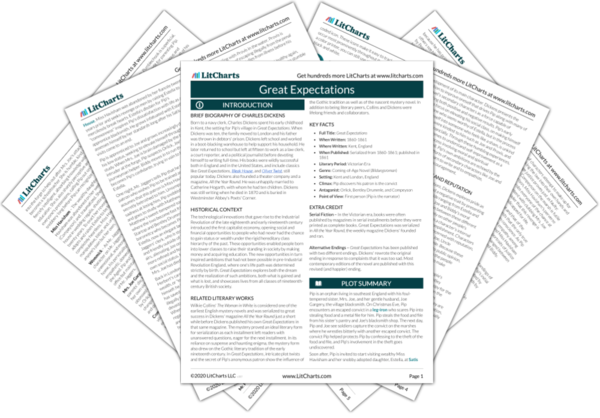As the novel distrusts British culture's traditional blind faith in family lines, it also looks skeptically at the traditional family unit. Great Expectations includes very few models of healthy parent-child relations. Many of the novel's characters—including Pip, Provis, and Biddy—are orphans, and those that aren't orphans come from broken or dysfunctional families like Herbert's, Miss Havisham's, Estella's, Clara's, and Joe's. Though Wemmick's relationship with the Aged Parent seems like an exception, it's important to note that Dickens introduces us to them at a stage of their lives when their dynamic has inverted and Wemmick parents his father rather than being cared for by him. Not until the last few pages do we encounter the functional traditional family newly started by Joe and Biddy.
Instead of showcasing traditional mothers and fathers, Dickens chooses to feature adoptive parents, mentors, and guardians. Among these characters, Joe epitomizes selfless kindness, protecting and nurturing Pip throughout his life in spite of Pip's teenage ingratitude. Though Provis doesn't participate in raising Pip, he too exemplifies steadfast devotion as he dedicates his life's fortune to Pip's future. Guardians like Mrs. Joe and Miss Havisham demonstrate more selfish modes of child-rearing as they use their charges to fulfill their own needs: Mrs. Joe to better her public image and Miss Havisham to avenge her betrayal. As in his treatment of social class, Dickens challenges a system organized by blood and presents a model of parentage determined by love and care, regardless of the genetic relation between parent and child.
Parents ThemeTracker

Parents Quotes in Great Expectations
"People are put in the Hulks because they murder, and because they rob, and forge, and do all sorts of bad; and they always begin by asking questions. Now you get along to bed!"

Unlock explanations and citation info for this and every other Great Expectations quote.
Plus so much more...
Get LitCharts A+"…lies is lies. Howsoever they come, they didn't ought to come, and they come from the father of lies, and work round to the same. Don't you tell no more of ‘em, Pip. That ain't the way to get out of being common, old chap…If you can't get to be uncommon through going straight, you'll never get to do it through going crooked."
"We have no choice, you and I, but to obey our instructions. We are not free to follow our own devices, you and I."
"I am what you have made me. Take all the praise, take all the blame; take all the success, take all the failure; in short, take me."
"Miss Havisham gives you to him as the greatest slight and injury that could be done to the many far better men who admire you, and to the few who truly love you. Among those few, there may be one who loves you even as dearly, though he has not loved you as long as I. Take him, and I can bear it better for your sake."
"Believe this: when she first came to me, I meant to save her from misery like my own. At first I meant no more…But as she grew and promised to be very beautiful, I gradually did worse, and with my praises, and with my jewels, and with my teachings, and with this figure of myself always before her, a warning to back and point my lessons, I stole her heart away and put ice in its place"…[Miss Havisham] burst out again, What had she done!
For now my repugnance to [Provis] had all melted away, and in the hunted wounded shackled creature who held my hand in his, I only saw a man who had meant to be my benefactor, and who had felt affectionately, gratefully, and generously towards me with great constancy through a series of years. I only saw in him a much better man than I had been to Joe.
Dear Joe, I hope you will have children to love, and that some little fellow will sit in this chimney-corner, of a winter night, who may remind you of another little fellow gone out of it forever. Don't tell him, Joe, that I was thankless; don't tell him, Biddy, that I was ungenerous and unjust; only tell him that I honoured you both because you were both so good and true, and that, as your child, I said it would be natural to him to grow up a much better man than I did.











